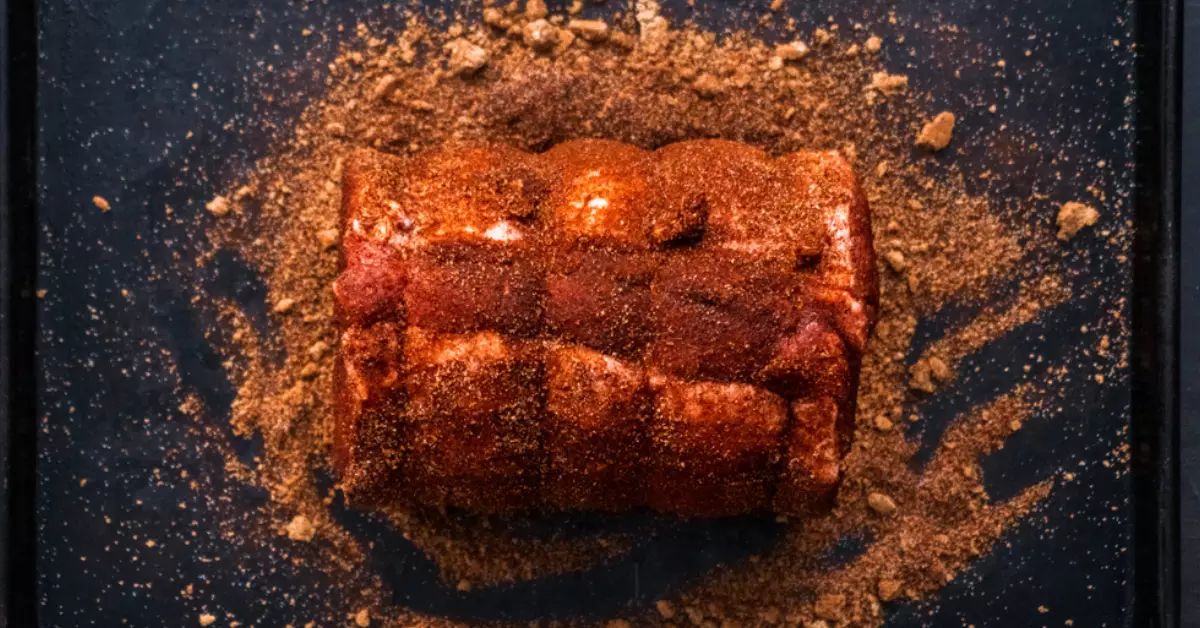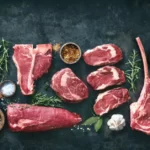Spice rubs have etched an irreplaceable place in the world of culinary arts. They are the unsung heroes behind the delightful flavors we often relish in barbecued or grilled meat. A typical spice rub is a combination of seasoning and spices, making a potent blend that augments the flavor profile of the meat.
The topic of our exploration revolves around the intriguing question of whether one can leave a rub on for too long. Spoiler alert: While the response is a complex one, it’s pivotal to know that the ideal duration can vary based on several factors, including the type of meat and the rub components.
The influence of a rub extends beyond a surface-level seasoning. It seeps into the meat, changing its chemistry and texture. The interaction between the spices, seasoning, and the meat protein determines the magic that unfurls on your taste buds.
What Happens When You Rub Spices?
Chemical Process Behind Spice Rubs
When spices are rubbed onto the meat, the magic begins at a molecular level. As the rub penetrates the surface, the spices interact with the protein fibers of the meat, transforming the flavor and texture. Some spices also contain natural tenderizing agents that can soften the meat, making it juicier and more succulent.
How Spice Rubs Enhance Flavor
A well-made rub doesn’t just add flavor; it amplifies the meat’s inherent taste. The rub creates a delectable crust on the meat’s surface when cooked, locking in juices and yielding a mouth-watering, savory crunch. It’s a symphony of flavors that sets the stage for a memorable culinary experience.
Can You Leave A Rub on Too Long: The Central Debate
In the culinary universe, the perfect timing for applying a spice rub has been the subject of much debate. It’s not a one-size-fits-all situation. Depending on the type of meat, the composition of the rub, and even the cooking method, the optimal duration can fluctuate significantly.
Common Beliefs and Misconceptions
Numerous theories about how long a rub should be left on meat have been floated in culinary circles. Some chefs vouch for immediate cooking post-rubbing, implying that a quick sear locks in the flavor. On the contrary, others lean towards a marination period, believing it allows the flavors to penetrate deeper into the meat.
A common misconception is that longer marination periods invariably lead to richer flavors. However, while this may hold for specific recipes or cuts of meat, it is not a universal truth. The risk of the rub overpowering the meat’s natural flavors or making it too salty are real possibilities if left on for too long.
Effects on Different Types of Meat
It’s crucial to consider the type of meat being seasoned. Dense, fibrous meats like beef brisket can withstand, and even benefit from, longer marination periods. These meats have complex textures and can absorb flavors over a prolonged period without losing their inherent taste.
On the other hand, meats with delicate flavors such as fish or chicken might end up being overpowered by the rub if marinated for too long. Their flavors are usually subtle, and a heavy or long-duration rub might overshadow these, resulting in a flavor imbalance.
The Science Behind Leaving a Rub on Too Long
In the quest to strike the right balance between marination duration and flavor enhancement, understanding the science behind it can be incredibly helpful.
Impact on Flavor Profile
One of the primary reasons for applying a rub is to enhance the meat’s flavor. However, leaving a rub on for too long could swing the pendulum in the opposite direction. Instead of enhancing the flavor, it might dominate the taste profile, making every bite a taste of the rub rather than the meat itself. If the rub is rich in salt, the problem exacerbates, leading to an overwhelmingly salty dish that might ruin the entire culinary experience.
Role of Salt: The Game-Changer
The role of salt in a rub is a game-changer. It draws out the moisture from the meat, helping the other spices stick better and penetrate deeper. But if left for too long, the salt starts curing the meat, which might not be desirable unless you’re specifically aiming for a cured texture. The result can be an overly salty piece of meat with a texture more akin to ham than a juicy steak or a tender chicken breast.
Can Over-Marination Damage the Meat?
While over-marination might not necessarily damage the meat, it can significantly alter its texture and flavor. Certain ingredients like papain found in paprika are natural meat tenderizers. If left on for too long, they could potentially over-soften the meat, leading to a mushy texture. Furthermore, the acid in certain spices and seasonings could start “cooking” the meat, affecting its texture and color.
The Perfect Duration for Applying a Rub
Determining the perfect duration for applying a rub can feel like a Herculean task, given the many variables at play. But fear not, armed with a basic understanding of these factors, you’ll be able to gauge the ideal timing with relative ease.
Recommended Times for Different Meats
The duration for which a rub should be left on largely depends on the type of meat being used. Here’s a basic guideline for some common types of meat:
- Fish and Seafood: Given their delicate flavors and texture, a rub time of 15-30 minutes should suffice.
- Chicken and Pork: These meats can handle slightly longer durations. A rub can be left on for anywhere between 1-2 hours.
- Beef and Lamb: These robust meats can endure a much longer rub duration. Depending on the specific recipe and cut, the rub can be left on for 3-24 hours.
Factors Affecting Optimal Duration
The perfect rub duration is also influenced by factors such as:
- Size and cut of the meat: Larger or denser cuts might require a longer marination period.
- Intensity of flavor desired: If you prefer a robust flavor profile, you might want to leave the rub on for a longer period.
- Ingredients in the rub: If the rub has a high salt or acid content, it might require a shorter marination period.
Common Mistakes When Applying a Spice Rub
Avoiding common pitfalls when applying a spice rub can make a significant difference to the end result. Here are a couple of common mistakes to steer clear of:
Overdoing It: How Much Is Too Much?
The phrase “too much of a good thing” holds when it comes to applying rubs. Excessive amounts of rub don’t necessarily translate into more flavor. In fact, it could lead to an overly spiced or salty dish that masks the meat’s natural flavors. It’s essential to remember that the rub’s role is to enhance the flavor, not overshadow it.
Spice Balance: Key to Perfect Flavor
The spices’ balance in a rub is pivotal to achieving the perfect flavor profile. Each spice contributes a unique flavor, and too much of one can upset the flavor balance. A well-balanced rub maintains a delicate equilibrium, where every spice gets a chance to shine without overpowering the others.
Practical Tips for Using Spice Rubs
Prepping the Meat for a Rub
Before applying the rub, ensure the meat is properly cleaned and patted dry. A light coating of oil can help the rub stick better and distribute evenly.
Ensuring Even Spread and Coverage
Apply the rub evenly on all sides of the meat, gently massaging it into the crevices and under the skin when possible.
Best Practices for Marination Duration
Once the rub is on, the meat should be refrigerated to marinate. The duration depends on the type of meat and the rub, as discussed earlier.
Does the Type of Rub Matter?
Dry Rub vs. Wet Rub: Any Differences?
Dry rubs and wet rubs can have different effects on the marination time. Dry rubs, composed of dried spices and herbs, are perfect for creating a flavorful crust. Wet rubs, which include liquids like oil or vinegar, can seep deeper into the meat, potentially reducing the marination time.
Influence of Rub Composition on Marination Time
The ingredients in the rub can influence the marination duration. For instance, rubs with a high salt or acid content may require a shorter marination time to prevent the meat from becoming too salty or tender.
Frequently Asked Questions
How Long Should I Leave a Rub on Chicken?
For chicken, a rub can be left on for 1-2 hours for optimal flavor infusion. However, if the rub has a high salt content, you might want to reduce the marination time.
Can I Leave a Rub on Overnight?
Yes, but it largely depends on the type of meat and the rub. Dense, tough meats like beef can often be left with a rub on overnight.
Does a Rub Need to be Refrigerated?
Yes, once the rub is applied, the meat should be refrigerated to ensure it remains at a safe temperature while it is marinating.
Conclusion: To Rub or Not to Rub
In the realm of spice rubs and marination, there’s no one-size-fits-all approach. The key lies in understanding the interaction between the meat, the rub, and the duration.
Having explored the science and philosophy behind spice rubs, it’s clear that the question of leaving a rub on for too long is multifaceted. It’s a harmony of many variables that, when played right, can create a culinary masterpiece.
The power of the perfect rub lies not just in its ingredients but also in its execution. So, the next time you’re prepping your meat for a rub, remember, it’s not just about how long you leave it on, but how well you understand the symphony of flavors and textures you’re creating.







